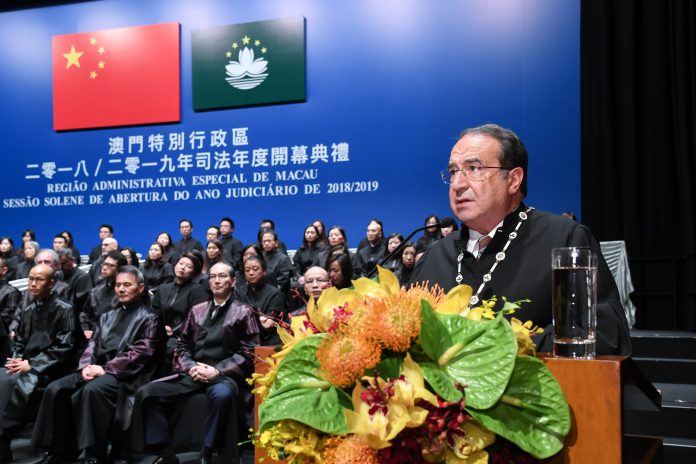Macau (MNA) – In its speech at the opening of the 2018/2019 judicial year the president of the Macao Lawyers Association (AAM), Jorge Neto Valente, raised several concerns in regard to delays in local court procedures; the lack of experienced judges in the local court system; the Land Law application and the revision of the Judicial Organisational Law and of the Civil Procedure Code.
Mr. Valente noted that the number of cases closed at the Court of First Instance (TJB) and at the Criminal Preliminary Hearing Court and that due accumulated delays in previous years, the total number of pending cases in the diverse courts reached 11,954 cases, a slight 10 per cent reduction from the year prior.
“That means that if there is no significant change in actual tendencies, we will nee around 10 years to remove or reduce substantially the number of cases changing from one year to the other,” the AAM president noted adding that some TJB court hearings were already scheduled for next year with the Court of Second Instance having cases dragging for years.
Mr. Valente inferred that local authorities had enough financial resources to increase the number of magistrates and judges and stated that while Hong Kong has recruited experienced magistrates from countries where Common Law is applied – even increasing the number of foreign Court of Final Appeal (TUI) judges – in Macau the number of experienced Portuguese judges had been reduced, with local magistrates still lacking experience.
The AAM head also noted that the revision of the Civil Procedure Code and the Judicial Organisational Law had yet to be concluded with Mr. Valente not agreeing with some of the proposed revisions.
The lawyer stated that court efficiency should be improved by increasing human resources, while the Civil Procedure Code revision proposed increased efficiency by reducing judge interventions and appeals.
“Arbitration and mediation are also not a universal panacea that can solve the efficiency of the courts. Justice is not increased by reducing court interventions,” he added.
Mr. Valente also criticised the fact that the Judicial Organisational Law revision didn’t include allowing the joint trial of top officials and their defendants at the same time at the TUI, with defendants remitted to TJB.
The proposed exclusion of Portuguese judges in dealing with court cases concerning National Security also merited a comment by Mr. Valente that “judges make decisions according to the law and not by following patriotic sentiments”.
The lawyer also again targeted the enforcement of the current Land Law considering that its strict application had become a “social problem” and led to “unfair situations” with non-developed land plots being reclaimed by the government despite the fault not falling on the land owners.
“There are situations when projects were not developed due to decisions by the administration, or due to delays caused by government services […] Nevertheless, he government still received premiums, adjusted rents and when it wanted declared the exploration concession expired taking possession of infra-structures, assets and constructions without compensations,” the AAM president added.




















